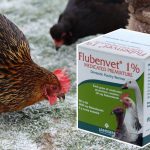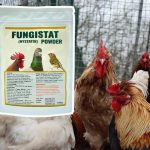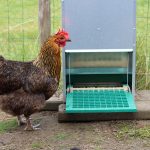How To Control Flies In The Chicken Coop?
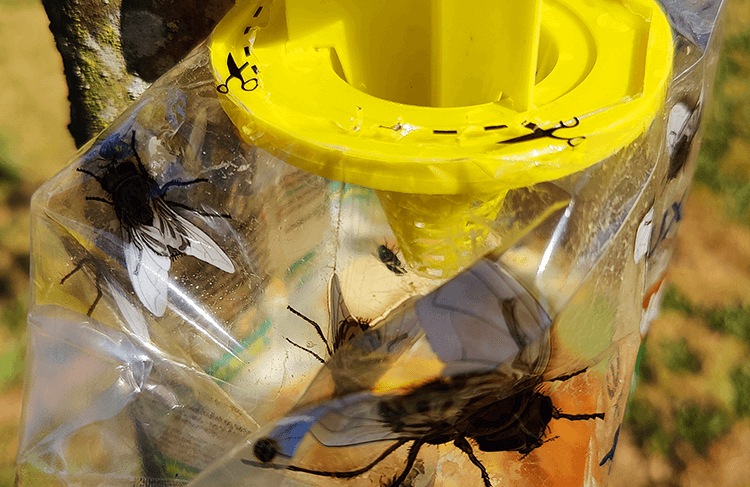
Flies can be a real plague during the summer months when the weather is warm and days are long. Especially inside the chicken coop, where there are chicken droppings and water near, you’ll find thousands of flies.
Not only are flies annoying, but they can also cause serious health issues to your chickens, like flystrike. Preventing and battling flies during warm months is critical but stay away from chemicals as they harm chickens and pets.
We’ll tell you how to control flies in the chicken coop naturally.
- Vegetation around the coop
- Keep the coop and run clean
- Ecologic fly traps and repellents
- Don’t leave feed out
Vegetation around the coop
Planting fly-repellent vegetation inside and outside the coop is an easy and natural way to prevent a fly pests. Many plants and herbs smell unpleasant to flies, so they’re reluctant to go near them. Before buying new greens to plant, always ensure these are not harmful to your chickens or pets.
We’ve narrowed down a list of all insect-repellent plants and herbs that are safe to use inside a chicken coop. All these plants and herbs are not only fly repellents but also keep bugs and mosquitos away.
- Petunias
- Lavender
- Marigolds
- Lemongrass
- Basil
- Nasturtiums
- Mint
This list can keep going endless; there are many more plants and herbs that are natural repellents and aren’t harmful to chickens and pets. We’ve narrowed it down to the most known and used herbs and plants, but if you do some research, you’ll find plenty more options.
Be careful with repellents such as daffodils, garlic, and onions, as they are harmful and toxic for chickens.
All plants and herbs listed above are safe for chickens, even when eaten. Nasturtiums, for example, are very hardy plants that are a great source of vitamin C. Chickens love eating wildflowers and plants when strolling around in the backyard or the coop. If you don’t want all the flowers getting eaten by your birds, you’ll need to fence off the plants.
Keep the coop and run clean
It’s stating the obvious. Manure and moisture attract flies and many other pests. When keeping multiple chickens, it’s almost a daytime job to scoop up all the droppings. And let’s face it, it’s not the most pleasant task either, but there are several tips to keep the workload as limited as possible.
Manure management systems inside the coop
There are many ways to keep the chicken coop as manure-free as possible. Or at least make cleaning it an easier task. Let’s address the most popular chicken manure management systems.
- Dropping board
- Choose the right bedding
- Deep litter method
Dropping Board
Placing a dropping board under the roosting perches makes cleaning up your chicken’s litter faster and easier if done daily. With the board placed correctly under the roosts, all the nighttime droppings are collected on the board, so you simply have to wipe them off in the morning. Remember to do this daily because old droppings will stick to the board and are very hard to scrape off.
Choose the right bedding
The type of bedding you use inside the coop is essential to reduce moisture and smell. Don’t use straw or hay as it will rot and hold moisture, allowing bacteria and flies to multiply. Wood shavings and sand are top-rated options to use as bedding material inside the coop due to their relatively low price and ease of access, and it does a great job. But these types of bedding need to be cleaned out or scooped over regularly, so the litter won’t start to smell.
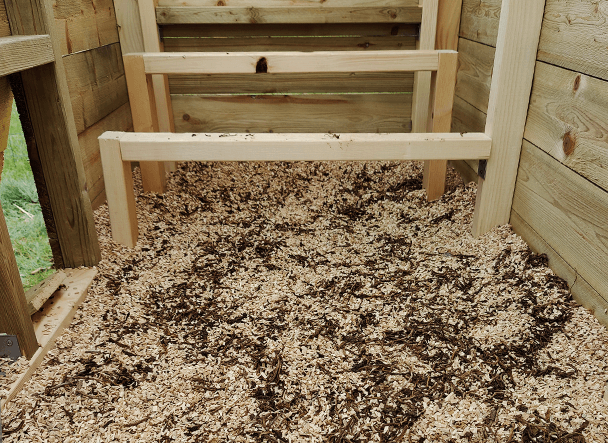
Deep litter method
An excellent way of chicken waste management is the deep litter method. The deep litter method is a way of composting your chicken’s droppings by letting the litter and droppings build up over time, so you only need to replace and clean out the bedding once or twice a year. The deep litter method never smells or attracts bugs or insects when executed properly. Instead of scooping out the old droppings and bedding to replace them regularly, you repeatedly turn over the soiled bedding and add a fresh layer. This saves you lots of time and by winter comes, your chickens benefit from the warmth of the thick composted bedding.
Keep the run clean
It’s nearly impossible with larger flocks to scoop up and remove all droppings from inside the run, especially when you are free-ranging your chickens. But remember that moisture and manure always attract flies. To prevent a fly infestation, you’ll need to scoop the poop regularly and as thoroughly as possible. If you find this a dreadful chore, free-ranging your chickens in a large backyard can be a solution. They’ll poop anywhere, but never all in one place, unlike inside the run, which will reduce the chances of a fly infestation.
ecologic fly traps and repellents
During summer, using ecologic fly traps and repellents can be very useful. Flies, wasps, and insects are everywhere, and preventive measures aren’t always enough to keep these flying pests away. Several types of fly traps and repellents can be purchased or can be made by yourself, each with its methods.
Fly traps lure the flies to the trap and kill them by electrocution or trap them in a substance. Repellents don’t trap the flies but discourage flies from coming near the chicken coop. Both methods work pretty well and are easy to use.
Hanging Ecologic fly trap
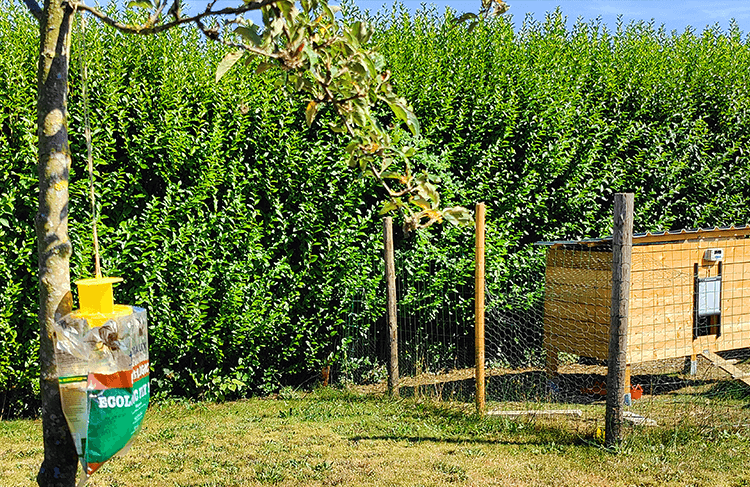
Disposable or reusable hanging fly traps eliminate the most common flies and are easy to use. Flies are lured to the bag due to the attractant bait inside the bag, which you activate by filling the bag with water. Place it somewhere near the coop, but don’t place the trap inside the coop, as you want to lure the flies away from the chickens. Don’t hang it too far from the coop either; use a part of the backyard that is not used as a seating or dining area. These fly traps are not to be used inside the house as the trap exudes a strong odor.
Electric flycatcher
Electric bug catchers or bug zappers are mainly used on summer nights to provide relief from annoying mosquitos when sitting on the patio. They can be used to lure and kill many bugs and insects, including flies. By hanging up an electric zapper inside the chicken run, you can decrease the number of various flying bugs inside the run. Some chicken keepers like to feed the killed flies to their chickens as a tasty snack.
But, there’s a significant downside to using electric bug catchers. According to various research, bug zappers do more harm than good for the environment. They are not very effective at killing mosquitos but also kill useful bugs like moths and parasitic wasps. They’re also quite expensive, unlike other solutions we address in this article.
DIY fly repellent
There are plenty of fly-repellent systems you can easily make yourself and are animal-friendly. The most known system is simply hanging CDs or DVDs on a string inside the run. If you don’t have any CDs anymore (it’s the twenties!), use a bag of water instead. Flies approaching the chicken run get confused by the refracted light the water or CD reflects and fly away. It doesn’t get any simpler than this!
Don’t leave the feed out
Spoiled feed, especially when wet, and leftover table scraps are pretty attractive to flies. When noticing any leftovers aren’t eaten, remove them from the run. Chickens can get quite messy, clean up any spilled feed and avoid spillage by purchasing an automatic chicken feeder or DIY a chicken feeder using PVC tubes. This reduces the chances of spilled feed and prevents pests and rodents from eating your chickens’ feed.
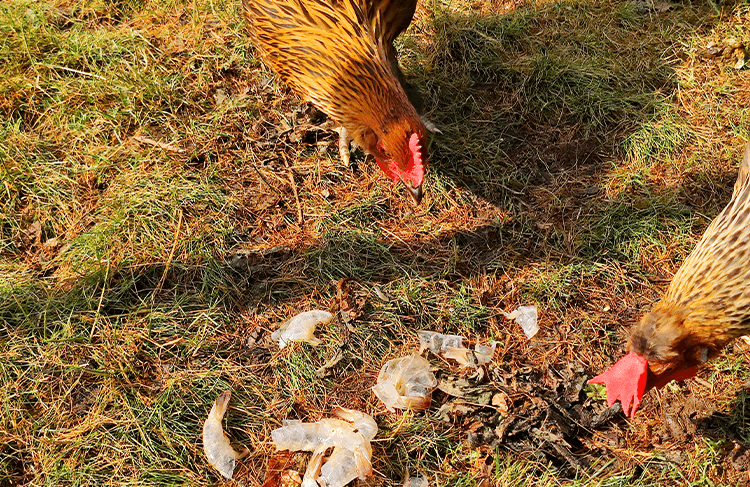
Summary
Flies can be a real pest in the summertime. Not only are they annoying, but they can also cause serious health threats for your chickens, like flystrike. There are several things you can do to prevent or solve any fly infestation inside the chicken run.
Surround your chicken run and coop with plants and herbs that repel insects and pests, but make sure it’s safe for chickens. Safe options are lavender, petunias, mint, and lemongrass, but there are many more.
Keep the coop and run as clean as possible, especially regarding your chickens’ droppings. Use the correct manure methods inside the coop and scoop up the litter inside the run regularly. It’s a dreadful chore but very effective to reduce a fly infestation.
Use fly traps or repellents; both are effective and easy to use. Be careful when using electric flycatchers; they’ll also kill useful bugs.
Don’t leave any chicken feed out; clean up any uneaten leftovers or table scraps.
